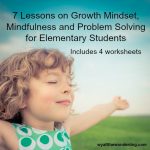Focus on joyful parenting
Connecting with the Heart of a Child
If I asked you to list the many challenges of parenting could you give me an extensive list?
Everything from getting George to clean up after himself to learning to play with his sister without fighting?
If I asked you to list the many joys of parenting, could you give me an equally extensive list?
Everything from the hug and kiss you get every night at bedtime to the thoughtful, “How can I help?” when you were totally in need of a kind word.
Would it be harder to list the joys than the challenges?
Which one do you talk about the most when you chat with other parents or your spouse?
While most of us have no trouble reciting a litany of our child’s frustrating behaviors, many times this focus colors not only our perception of the parenting relationship but the behavior that we experience. It’s not that we aren’t caring parents who want the best for our kids. It’s just that somehow we all tend to get stuck on the negative no matter what. And what we look for, is what we see and what we get.
How do you improve your communication?
Three Ways to Improve Communication
Connect with your child’s heart: Initiate conversation with your child that involves more than behavior. Instead of “What did you do at school today?” try “When did you feel happiest today?” “What was the most frustrating thing that happened?”
- Learn the answers to questions like:
- What are you afraid of?
- What are you most proud of?
- What are your interests, dreams and disappointments?
- What makes you anxious? happy? nervous? frustrated?Share your heart
Help children know your story as well: Young children especially love hearing stories about what it was like for you when you were their age.
- What were your challenges when you were a kid?
- What was your dream?
- What were your successes and failures?
Re-frame misbehavior as an opportunity to learn
Good discipline isn’t just following up on misbehavior with an action that results in punishment and good behavior with a reward. It’s an opportunity to teach and learn.
Instead of: “George you grabbed that toy from your sister and now she is crying. Give it back to her right now or you are going to time out!”
Try: “George you grabbed that toy from your sister and now she is crying. What do you think you need to do to make the situation better? How can you help?”
Maintain limits and rules through a dialogue that encourages empathy and problem-solving.
School Counselor Resource: Grab ‘n Go Lesson on Growth Mindset:
Wyatt the Wonder Dog Learns about Mindset

Wyatt the Wonder Dog didn’t make it on the All Star baseball team and he feels like a loser. All his friends will be playing baseball this summer, while he and his pesky sister, Callie, visit grandparents at the beach. How Wyatt learns to handle disappointment and failure will be an important lesson for the future. Will he give up trying new things? Will he have the confidence to try again? Are there some things that take more practice and persistence to learn than others?
Wyatt the Wonder Dog Learns about Mindset (Wyatt the Wonder Dog Books) (Volume 5)
School counselor resources to expand the lesson in Wyatt Learns about Mindset:

Wyatt the Wonder Dog Lesson Plan and Activities

Seven Lessons Mindfulness, Growth Mindset and Problem Solving

[…] Joyful Parenting […]